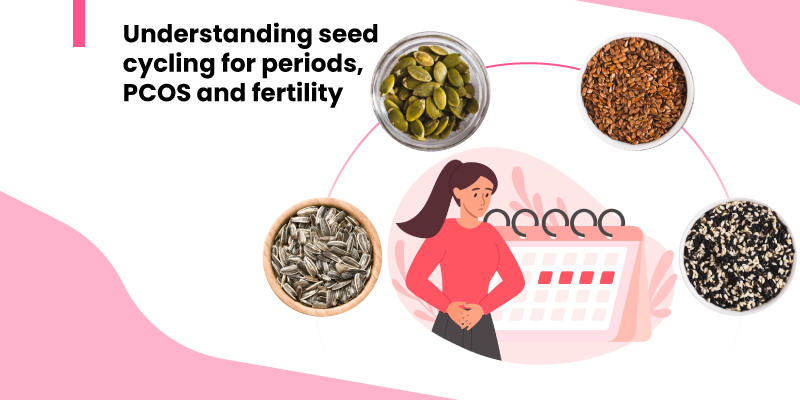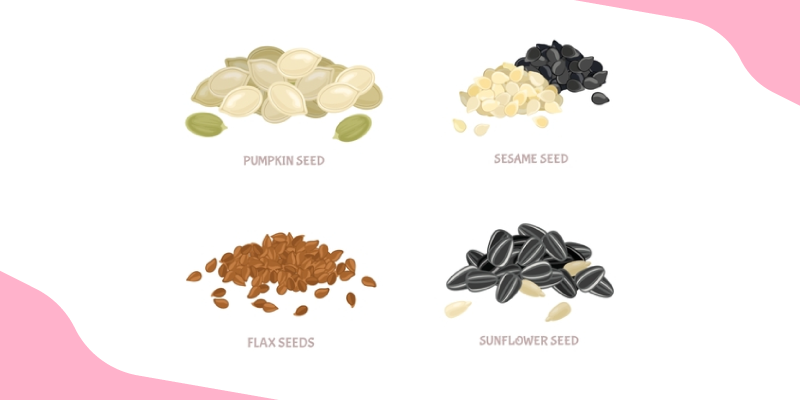Understanding seed cycling for periods, PCOS and fertility

Author: Dr. Sai Manasa Darla, Consultant, Fertility Specialist & Laparoscopic Surgeon
Hormones are an integral factor in the systematic functioning of the human system. They play a major role in the proper functioning of the human reproductive system. The female reproductive system and the menstrual cycle are largely affected by hormones and any disruption in the delicate balance of the hormones, leads to fertility issues.
Hormonal imbalance is the most common reason for infertility among women. Although advanced medicine can treat hormonal imbalances, holistic methods help in treating and healing the endocrine system and overall human system thanks to their own set of benefits. One such holistic approach that is garnering attention in recent times is the concept of “seed cycling”.
Let’s see what is seed cycling and if it is just another trend or does it help.
Meet seed cycling:
Seed cycling involves consuming flax, pumpkin, sunflower, and sesame seeds during various stages of the menstrual cycle i.e. follicular phase and luteal phase. It helps in balancing the hormones and improves fertility in women.
Seed cycling benefits
· Regulates irregular periods
· Helps with PCOS and related symptoms
· Decreases PMS symptoms
· Reduces acne due to hormonal imbalance
· Eases pre/peri-menopausal symptoms
· Improves libido
How does seed cycling work?
The concept of seed cycling for periods and seed cycling for PCOS gained momentum among women due to its effectiveness in supporting the balance of the key hormones (estrogen and progesterone) that are constantly changing during the menstrual cycle.
To understand seed cycling benefits better it is important to understand the menstrual cycle and its phases. An average menstrual cycle is 28 days long and has 2 phases.
The phases of the menstrual cycle include:
Follicular phase:
This is the first phase that is counted from the first day of the period to the day of ovulation i.e. the first two weeks (day 1-14) of the menstrual cycle. In this phase, the uterus lining is shed, and the follicle-stimulating hormone (FSH) stimulates the ovaries and initiates egg development. This process leads to a rise in estrogen levels. Healthy estrogen levels help in the building of the uterine lining and play a role in boosting sexual desire.
Luteal phase:
Day 15 – 28 of the menstrual cycle is called the Luteal phase i.e. it starts from ovulation until the next period. Progesterone is the dominant hormone during the luteal phase. After ovulation, progesterone levels rise to help in implantation and maintaining a pregnancy during the 1st trimester.
Also, seed cycling benefits can be attributed to the presence of nutrients such as lignans, fibers, omega-3 fatty acids, vitamins, and minerals. These nutrients help in balancing the sex hormones i.e. estrogen and progesterone and in reducing inflammation.

What are seed cycling benefits?
1. Seed cycling for periods:
Seed cycling for periods is an effective and natural method to get irregular periods back on track. During the follicular phase, consume flax seeds and pumpkin seeds. The lignans and phytoestrogens present in the flax seeds balance the estrogen levels by mimicking estrogen. Flax seeds can also have a beneficial role in increasing progesterone production during the luteal phase. Pumpkin seeds are rich sources of omega-3 fatty acids.
During the luteal phase add a spoon of sunflower seeds and sesame seeds to support the production of progesterone. The lignans in the sesame seeds have been shown to support the balance in progesterone hormone and improve blood cholesterol levels and antioxidants in postmenopausal women. Sunflower seeds are an excellent source of healthy fats that are essential for the proper functioning of the reproductive system.
When to start seed cycling for periods?
It is ideal to start seed cycling for periods on the first day of the menstrual cycle.
2. Seed cycling for PCOS:
Using seed cycling for PCOS yields multiple benefits such as reducing the number of ovarian cysts. Zinc present in the pumpkin and sesame seeds improves the hormonal balance of progesterone and estrogen levels and their function by lowering androgens. Using seed cycling for PCOS also improves thyroid function. The omega-3 fatty acids found in flax seeds and sunflower seeds help in lowering insulin resistance and blood cholesterol levels.
3. Seed cycling for conceiving:
Owing to the multiple benefits of seed cycling such as balanced hormones, regulated menstrual cycle, improved ovulation, and increased progesterone and estrogen levels it would be safe to say that seed cycling is beneficial for improving fertility too.
· Vitamin E present in the sunflower seeds improves the quality of the egg and sperm to improve the chances of fertilization and positive pregnancy outcomes.
· Antioxidants present in the seeds reduce inflammation to increase implantation chances.
Take away:
Essential fatty acids, vitamins, minerals, and antioxidants that are vital for the proper functioning of the reproductive system are contributed by the four seeds that have a profound impact on the hormonal health of a woman. Although, it is important to remember that this is not the complete cure for hormonal imbalance, consult with a fertility specialist before you opt for seed cycling.










